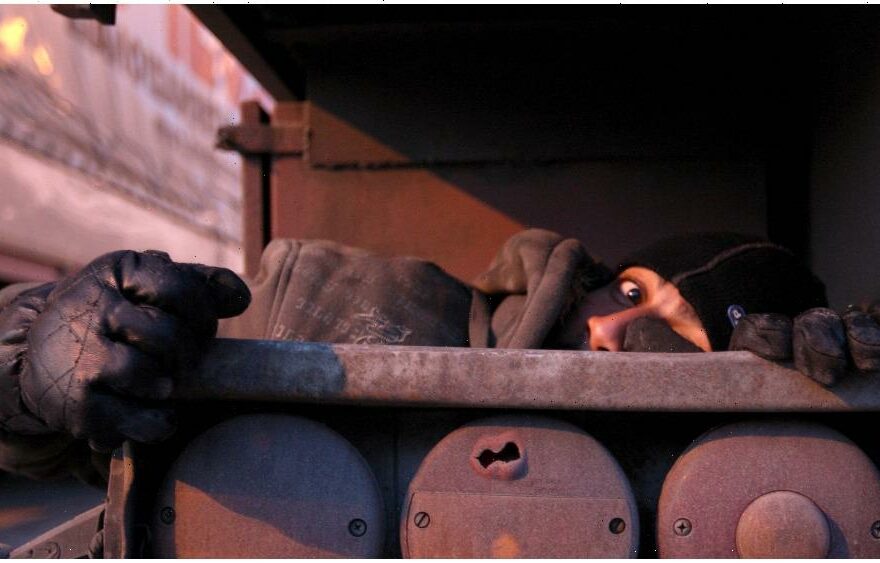The intense shelling had already commenced when Greek photojournalist and documentary filmmaker Giorgos Moutafis arrived in Irpin, a suburb of Kyiv that lay in the path of Russia’s relentless military advance across Ukraine.
It was in the midst of the chaotic evacuation on March 13 that Brent Renaud, an American filmmaker and journalist, was killed after he and his film crew were shot at by Russian troops. Moutafis appeared on the scene just minutes later.
“When we arrived in the city, we saw the rescue team evacuating the bodies. I saw them carrying him inside a sheet,” said Moutafis, speaking to Variety by phone from Kyiv. “A little earlier I saw his friend, another photographer, Juan Arredondo [who was wounded in the attack]. I said to him, ‘Friend, what can I do to help?’ And he said, ‘Please find my friend, he was left behind.’ It was a terrible moment.”
Moutafis, whose feature-length documentary “The Other Half” world premieres this week at the Thessaloniki Documentary Festival, has spent more than a decade chronicling the influx of refugees into Europe. Produced with the support of iMEdD (Incubator for Media Education and Development), his directorial debut compiles footage taken by the veteran photojournalist between 2009 and 2021 on Greece’s borders, in the Aegean Sea, and in North Macedonia, Albania, Serbia and Turkey.
Documenting the war in Ukraine, and the ongoing humanitarian crisis unfolding there and across Eastern Europe, has marked a sad continuation of Moutafis’ life’s work. “As a photographer, I’ve seen 10 different prime ministers, ministers. I’ve seen fences, borders, shipwrecks,” he said. “All these 15 years are a vicious cycle. Nothing has changed.”
Moutafis arrived in Kyiv on Feb. 13 on assignment for the German newspaper Bild. He was among the first journalists to begin reporting as Russian troops massed along the border with Ukraine, and many observers started to suspect an invasion was imminent.
Yet few on-lookers expected an attack of the scale and intensity that was launched on Feb. 24. “I thought, ‘What a beautiful city. We’ll drink a coffee in the square. Everything will be okay,’” he said. “No one thought the war would come here. And day by day, it started.” Within the span of a few brutal days, life in the Eastern European nation was completely upended. “[The Ukrainians] had a normal life like you and me. They didn’t expect this condition. But you never know when war will knock on your door.”
According to the United Nations, that war has already created more than two million refugees and displaced millions more within Ukraine’s borders. While appreciative of the response so far across the continent, where many Ukrainians have been welcomed with open arms, Moutafis was nevertheless insistent that Europeans avoid a double-standard in how they treat vulnerable populations fleeing foreign lands.
“War can’t be measured on a scale. War hurts the same everywhere,” he said. “We can’t say that the Ukrainians, the Afghans, the Syrians hurt differently. The pain is the same for everyone.
“I don’t want to separate the Ukrainians from the other refugees. The refugees are the same people,” he continued. “Just like in the past, our parents and grandparents had gone to America. Whether it’s because of the economic situation or because of war, no one wants to leave their home.”
Moutafis’ grandfather and namesake was among the more than one million ethnic Greeks forced to flee violence in modern-day Turkey and neighboring regions around the Black Sea in the 1920s – a heritage he shares with many of his countrymen. “He made the same journey as these refugees exactly 100 years ago,” said the director. “We have this in our blood.”
“The Other Half” is partly a “confession” of the personal impact made on the director by a refugee crisis he’s spent 15 years witnessing and documenting firsthand. “I’ve lived this situation. I’ve walked, I’ve slept, I’ve eaten, I’ve cried, I’ve hurt, I’ve carried the dead. I’m a part of this story,” he said. “This film that I made presents a truth, my truth, and the truth of those people who cross the borders – the truth of the immigrants, the truth of the refugees.”
Though the director turned the camera on himself to record an emotional testimonial of how the refugee crisis has shaped him personally, he was determined to play a peripheral role in the film. “I don’t think people are interested in how I feel,” he said. “I do this so people will understand how the refugees feel and what is actually happening at the border. The injustices. The refugees move forward, and they send them back. They go a little further, and they send them back. Some cry, others die, without these people having committed any crime.”
Ahead of the film’s March 17 premiere, Moutafis said his greatest hope was that “The Other Half” would make an impact in the capitals of Europe, whose policy toward refugees he sees as woefully inadequate. “This work is my own comment to the decision-makers,” he said. “For me, that would be the success, if those people watch the film and make the right choices.”
For his part, Moutafis was forced to make the difficult decision to leave Greece to document the war in Ukraine just two weeks after celebrating the birth of a daughter. It will likely be another month before they’re reunited. The director hopes to address the audience at his film’s Thessaloniki premiere by video call, with current events preventing him from returning to Greece sooner. “Unfortunately, war doesn’t have an expiration date,” he said.
Source: Read Full Article
